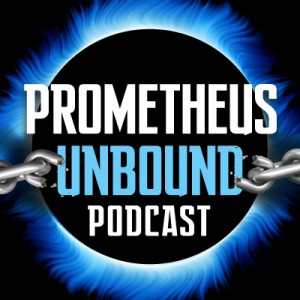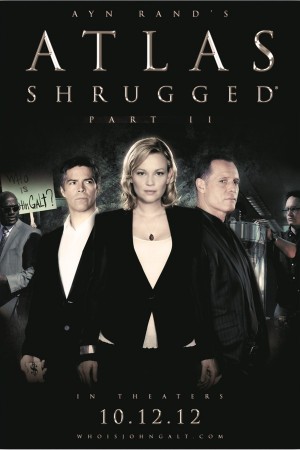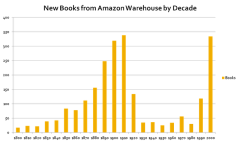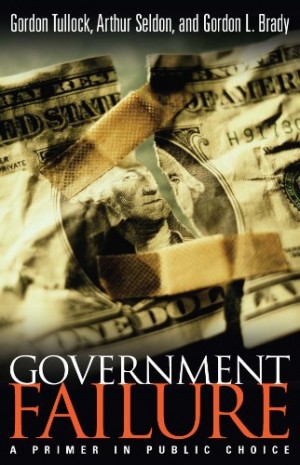
In episode three of the Prometheus Unbound Podcast, Matthew and I have a fantastic interview with the wonderful Jeffrey Tucker, editor of Laissez Faire Books. It’s a long one, about an hour and fifteen minutes, and we knew you’d be eager to listen to Jeffrey, so we wasted no time with chit-chat and got right down to business. We covered a number of topics ranging from LFB, intellectual property, and Jeffrey’s favorite fiction.
We started off by asking Jeffrey Tucker what it’s been like working for a commercial publisher and bookseller after having worked for a nonprofit educational institution, the Ludwig von Mises Institute, where he was editorial vice president, for so long.
Then we went on to talk about the business model of Laissez Faire Books and the role of the publisher in the digital age as a curator and service provider (curation as a service); the compatibility of open source and business; intellectual property; the nature of competition; how many entrepreneurs and businesses misidentify the source of their profitability and don’t understand why people buy their goods or services; how copyright has held back the publishing industry; and markets as institutions of teaching and learning.
[continue reading…]
Help Promote Prometheus Unbound by Sharing this Post

In episode two of the Prometheus Unbound Podcast, Matthew and I (Geoffrey) discuss libertarian speculative fiction and introduce the Book of the Month, Today’s Tomorrows Writing Prompt, and Fiction Forecasts segments of the show.
We break the ice with some brief chit-chat about what we’ve been reading before seguing into our discussion of libertarian spec fic. The Book of the Month is Coyote by Allen Steele. In Today’s Tomorrows Writing Prompt, we turn a speculative eye on the very real possibility of an intellectual-property dystopia. And in Fiction Forecasts, we talk about upcoming (at the time of recording) television shows, movies, and books.
What We’ve Been Reading
Libertarian Speculative Fiction
We covered a lot of ground in our discussion of libertarian spec fic, but we really only scratched the surface of this broad, deep, and no doubt controversial topic. I’m sure we’ll be revisiting many of the stories and issues we covered, and many more besides, in future episodes. So subscribe and stay tuned!
Here’s a brief rundown of some of the things we covered: what qualifies a work of fiction as libertarian; libertarian themes in science fiction and fantasy; why they seem to be more common in science fiction and why libertarians seem to favor this genre; our favorite works of libertarian spec fic; the Prometheus Awards; and probably more that I’m forgetting as I write this.
[continue reading…]
Help Promote Prometheus Unbound by Sharing this Post

At long last, here is the first episode of our new, original podcast.
First, Matthew and I break the ice by briefly talking about what we’ve been reading recently. I had just finished Kameron Hurley’s debut novel God’s War. Overall, I think it’s a good effort with an interesting story and world-building but is not without its flaws. Matthew had recently finished Live Free or Die by John Ringo. It was a 2011 Prometheus Award finalist, not a winner as I mistakenly thought while recording the podcast and, according to Matthew, didn’t deserve to be.
Our interview with Stephan takes up most of the episode. It’s around 53 minutes long and starts 9:40 minutes in. For those who don’t already know him, Stephan Kinsella is a patent attorney and prominent libertarian legal scholar. He is best known for his opposition to intellectual property.
We invited Stephan on the show to discuss the problems of intellectual property and piracy in the Digital Age. But first we had to ask him about his love of science fiction and fantasy. We got him to mention some of his favorite authors and books (see below for a list), and we even talked about the Hobbit movie for a bit.
Then, at about 23:15 in, we dove into the meat of the interview. Stephan explained the historical origin of copyright (censorship) and patents (government grants of monopoly privilege, which is what copyright is now too really), how intellectual property has shaped and distorted the film and publishing industries, including Hollywood’s move to California to avoid patent disputes, and why reform is not enough. We also discussed how the Digital Age — the age of the internet, smartphone, ereader, and globalization — is making the evils of copyright and patents more obvious and acute while at the same time undermining traditional business models built around intellectual property. And finally, we explore ways artistic creators might earn a living in a world without intellectual property laws.
[continue reading…]
Help Promote Prometheus Unbound by Sharing this Post

If you tried to watch the livestream of the Hugo Awards event at Chicon 7 (Worldcon) last night, you were in for a rude surprise. The feed cut off, never to be restored, just as Neil Gaiman was giving his acceptance speech. Why? i09 has the scoop, but fingers the wrong culprit.

What happened was that the Hugo Awards showed clips from some Doctor Who episodes and a Community episode prior to Gaiman’s speech. UStream’s copyright enforcement robots detected this and shut down the feed, as they had been programmed to do. io9’s editor-in-chief, Annalee Newitz, lays the blame on UStream. Its copyright enforcement robots are too dumb to realize that not only did the Hugo Awards have permission to show those clips but that, even if they had not, showing them would have been fair use anyway.
Is it UStream’s fault that its copyright enforcement robots are unable to distinguish between illicit copyrighted content and copyrighted content the user has permission or a fair-use defense for airing? Should UStream spend more money on smarter robots? if it’s even possible to code smart enough robots to do this? I don’t think so.
[continue reading…]
Help Promote Prometheus Unbound by Sharing this Post


Reason.com has had some interesting posts recently.
One is on the subject of fan fiction vs. copyright. Does fan fiction count as a copyright violation? What should authors think or do about it? My response to the first question is: Who cares? Copyright is an illegitimate government grant of monopoly privilege that gives people legal ownership over that which cannot really be property, ideas, and which cannot be enforced without infringing on the prior real property rights (in one’s body and physical objects) of others. My response to the second question is: Authors should embrace fan fiction as community-building and free advertising. Fighting fan fiction only makes you a dick, a criminal (in my view) dick if you sue.
Anyway, now that I’ve worked that rant out of my system, check out the post Fan Fiction vs. Copyright – Q&A with Rebecca Tushnet and watch the interview below. Tushnet is “a member of the Organization for Transformative Works, Tushnet works to defend fan fiction creators caught in the legal debate between protected intellectual property and fair use.” I’ve previously discussed how Angry Robot Books is embracing fan fiction, if not as much as we libertarians and fiction fans would like.
[continue reading…]
Help Promote Prometheus Unbound by Sharing this Post


How gigantically humongous and intrusive is the federal government? A traditional measure is to look at the pages of regulations in the Federal Register, which is, by now, probably the world’s largest book collection. The problem with this approach is that it takes no account of how a single bad regulation can have monstrously deleterious effects.
Copyright regulation is a good example of this. There was no universal enforcement until the very late part of the 19th century, and terms were mostly short in the early days of this regulation. In the course of the 20th century, regulations became ever more tight and the copyright terms ever longer, so much so that today, the words you sign away to a conventional publisher are theirs to keep for your lifetime plus 70 years!
One standard argument for doing this is that noncopyrighted works will not be efficiently exploited. You have to assign ownership or else the resource will vanish into the ether. No one will care about it, and civilization will lose extremely valuable literary works. Our market for ideas will be impoverished.
Now, to me, this argument seems obviously false, but that’s probably because of my own experience in publishing. I’ve seen it happen — so many times that it is predictable — that once a work has fallen out of print but is still under some kind of protection, it is mostly neglected by the heirs. No one who “owns” the work has the incentive to bring it to light, while those who care about it fear the law or don’t want to pay some arbitrary price set by the owners.
Meanwhile, when a work is public domain, there are dozens of people bidding to get it into print. This was true all throughout history, actually. The reason American school kids in the 19th century read British literature is that it was not regulated in the United States, and therefore, it could be sold very cheaply and distributed very widely. It is true today: Whether music or books, the material in the commons is far more in demand than that which is regulated. And the demand leads to the supply.
In other words, the opposite of the conventional exploitation theory is correct. The copyrighted works drop from memory, while the public domain works last and last. But of course, this observation draws from my deep involvement in the industry, and we can’t expect academic scribblers to understand anything about how the world actually works in real life.
[continue reading…]
Help Promote Prometheus Unbound by Sharing this Post


It’s been a news-heavy month. Here are a few more tidbits:
- Yesterday, Tor/Forge announced that it will make all of its ebooks completely free of DRM by early July 2012. This is a momentous and welcome change. Tor/Forge is a genre imprint of Macmillan, one of the Big Six publishers. It’s the first of these publishers to cave to author and cusotmer pressure on DRM. It may have helped that Macmillan is not a publicly traded company. Cory Doctorow believes more Big Six publishers are sure to follow; he’s “had contact with very highly placed execs at two more of the big six publishers.”
- Last month, James Cameron promoted private deep-sea exploration. He’s also partnered with Google’s Larry Page and Eric Schmidt, and Ross Perot Jr., to back private space company Planetary Resources. Immediate plans are to design and build low-cost robotic spacecraft for survey missions. The firm, founded and chaired by Peter Diamondis (creator of the X-Prize Foundation) and Eric Anderson, hopes to then build on this technology and begin mining Near-Earth Asteroids (NEAs) within the next ten years. For an extended explanation of how and why Planetary Resources can succeed, read Phil Plait’s post on the Bad Astronomy blog. We live in exciting times for the exploration and exploitation of space.
[continue reading…]
Help Promote Prometheus Unbound by Sharing this Post
















